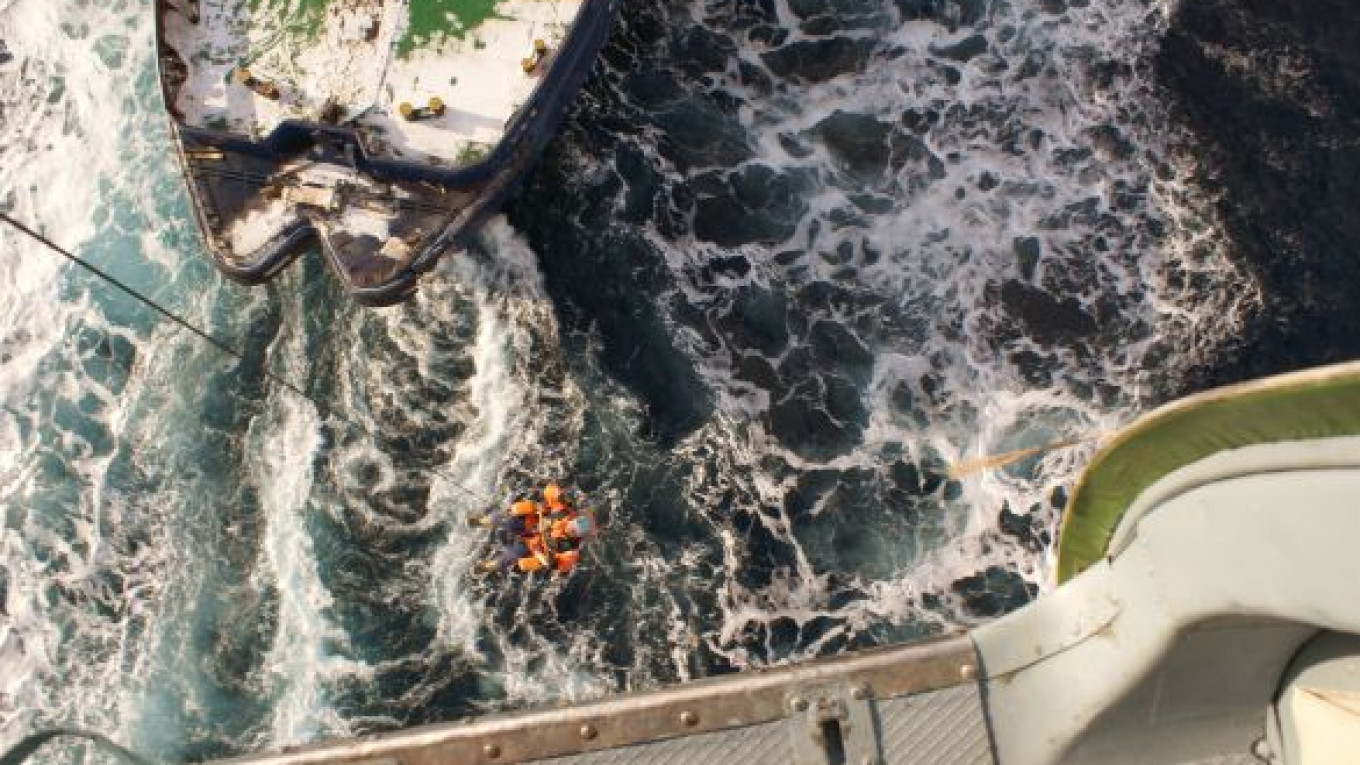Four lifeboats and an inflatable raft were found empty in frigid waters near where an oil rig sank off Russia's eastern coast, rescuers said Tuesday, as hopes faded of rescuing the 39 men still missing.
The search continued for a third day, with an airplane, two helicopters and three ships scouring the Sea of Okhotsk where the rig capsized and sank on Sunday.
Of the 67 men aboard, 14 were rescued from the icy water. The Emergency Situations Ministry said Tuesday that 11 bodies have been recovered and three objects believed to be bodies have been spotted but not yet retrieved. There was no sign of the others.
The State Sea Rescue Coordination Center said lifeboats that had been spotted earlier turned out to be empty, though one of the boats had its emergency lights on.
The Kolskaya floating platform was being towed back to a Sakhalin Island port in a fierce storm when a strong wave broke some of its equipment and portholes, and it capsized in the choppy water.
The survivors suffered from exposure and bruising, but doctors said they were most in need of psychological treatment after the trauma.
Ivan Mishnev, one of the hospitalized survivors, said he swam away from the platform and saw it capsize. "I was afraid I'd be sucked down into the crater that formed when it sank," he said in an interview broadcast on NTV television.
The rescue operation began only two hours after the rig sent an SOS calling for help and investigators were looking into whether more could have been done to save the crew, said Alexander Dyomin, a transportation investigator.
They also were investigating the decision to transport the platform across the open sea during winter, he said on state television.
Relatives of the crew have insisted they were forced to move the platform against their better judgment. The Kolskaya's captain, Alexander Kozlov, opposed the decision but his objections were ignored, according to his wife, Lyudmila. She was quoted by newspaper Komsomolskaya Pravda as saying he had called home last week and said he feared that the rig would topple in a storm.
Most of the crew were from the northwestern city of Murmansk, where a day of mourning was observed Tuesday.
The platform, 70 meters long and 80 meters wide, was built in Finland in 1985. It was used recently by energy giant Gazprom.
A Message from The Moscow Times:
Dear readers,
We are facing unprecedented challenges. Russia's Prosecutor General's Office has designated The Moscow Times as an "undesirable" organization, criminalizing our work and putting our staff at risk of prosecution. This follows our earlier unjust labeling as a "foreign agent."
These actions are direct attempts to silence independent journalism in Russia. The authorities claim our work "discredits the decisions of the Russian leadership." We see things differently: we strive to provide accurate, unbiased reporting on Russia.
We, the journalists of The Moscow Times, refuse to be silenced. But to continue our work, we need your help.
Your support, no matter how small, makes a world of difference. If you can, please support us monthly starting from just $2. It's quick to set up, and every contribution makes a significant impact.
By supporting The Moscow Times, you're defending open, independent journalism in the face of repression. Thank you for standing with us.
Remind me later.






